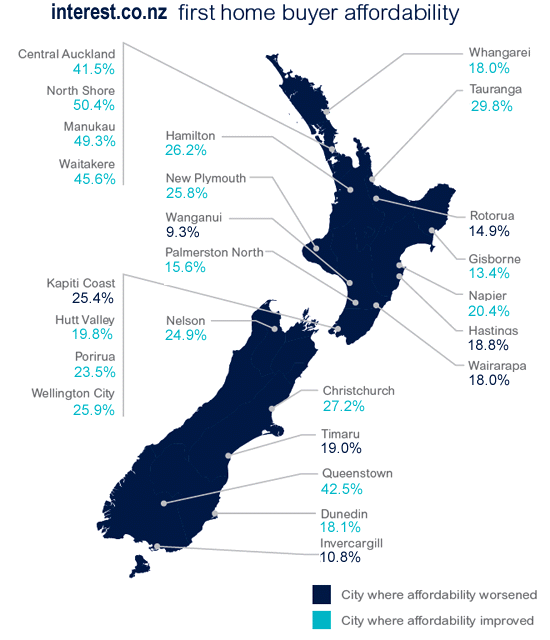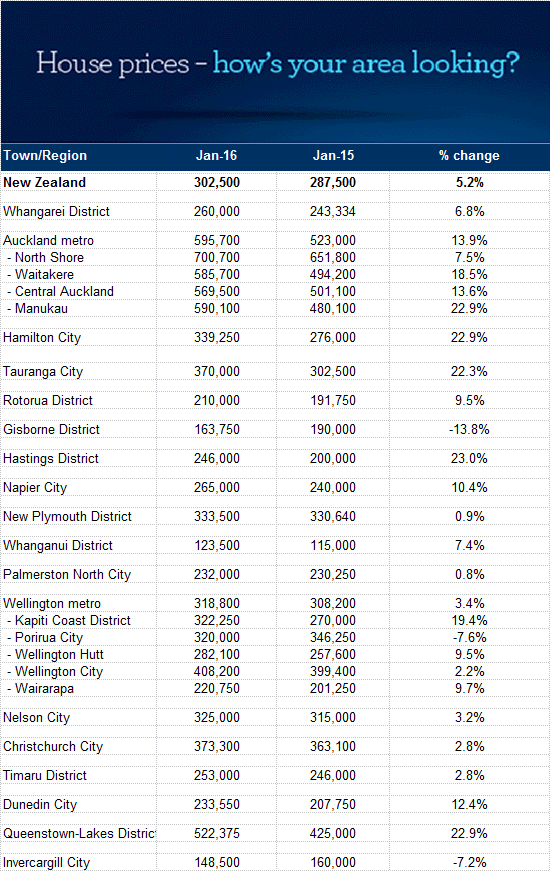
By Greg Ninness
There was a significant improvement in housing affordability for first home buyers in many parts of the country including Auckland last month, thanks to a sharp drop in house prices combined with ongoing declines in mortgage interest rates.
According to interest.co.nz's Home Loan Affordability Report for January, the lower quartile selling price of all home sales recorded by the REINZ in January was $302,500, down from $310,000 in December.
Around the country, the lower quartile price (the price point that 25% of sales would be below and 75% above) declined in six regions; Northland, Auckland, Manawatu/Whanganui, Wellington, Central Otago/Lakes and Southland, and rose in six; Waikato/Bay of Plenty, Hawkes Bay, Taranaki, Nelson/Marlborough, Canterbury/Westland and Southland.
The biggest fall in the lower quartile price was in Central Otago/Lakes, where it dropped by $33,200, from $412,400 in December to $379,200 in January, although December's lower quartile price in the region was exceptionally high.
That was followed by Auckland where the lower quartile price dropped from $624,000 in December to $595,700 in January.
At the same time the average of the two year fixed mortgage rates offered by the major banks dropped from 4.78% to 4.57%.
That combination of lower prices and lower mortgage rates pushed down the weekly mortgage payments on a lower quartile-priced home in many parts of the country, making them more affordable.
In Auckland the mortgage payments on a home purchased at December's lower quartile price of $624,000 (at December's average two year fixed rate of 4.78%) would have been $767.29 a week.
But the mortgage payments on an Auckland home purchased at January's lower quartile price of $595,700 (at January's average two year fixed rate of 4.57%) would have been $714.38 a week, a saving of $52.91 a week.
In Central Otago/Lakes the savings were even greater, with the weekly costs of servicing a mortgage on a lower quartile priced home dropping from $488.28 in December to $435.00 in January, leaving home buyers with an extra $53.28 a week in their pocket.
Other regions where the cost of servicing a mortgage at the lower quartile selling price dropped from December to January were; Northland -$28.29 a week, Manawatu/Whanganui -$10.62, Wellington -$22.70, Nelson/Marlborough -$7.43 and Otago -$6.82.
Those regions where the cost of servicing a mortgage on a lower quartile priced home rose between December and January (because the increase in the regions' lower quartile prices more than offset the benefits of the lower interest rate) were; Waikato/Bay of Plenty up $4.03 a week, Hawkes Bay up $30.25, Taranaki up $14.15, Canterbury/Westland up $14.40 and Southland up $4.17 a week.
Housing still unaffordable for most first home buyers in Auckland
The Home Loan Affordability Report also tracks the median net take home pay of typical first home buying couples (defined as a couple aged 25-29 and both in full time employment) and measures how much of their weekly income they would need to set aside to make the mortgage payments on a lower quartile-priced home.
If the mortgage payments take up 40% or less of their take home pay it is considered affordable, while any more than 40% is considered unaffordable.
In Auckland, typical first home buying couples would have take home pay of $1575.16 a week and would need to set aside $714.38 (45.35%) to make their mortgage payments.
Although that is down from 48.85% in December, it means that even with the latest drop in house prices and interest rates, housing is still unaffordable for most first home buyers in Auckland.
So it might be more correct to say that the latest drop in prices made housing slightly less unaffordable for first home buyers in Auckland.
However Auckland remains the only region where housing is unaffordable for first home buyers.
In Waikato/Bay of Plenty the mortgage payments on a lower quartile-priced home would take up just 23.24% of a typical first home buying couple's take home pay, in Wellington it would be 22.22% and in Canterbury it would be 25.62%.
That means that providing both of them are working, buying their own home should be achievable for typical first home buying couples in all regions of the country except Auckland.

11 Comments
A balanced piece on the property market.
I don't think we are going to see the AKL developers dishing out iPhones quite yet.....
http://www.bloomberg.com/news/articles/2016-02-18/hong-kong-developers-…
I have some very good connections in the London property market who have been telling me things have been getting worse at the top end for several months.Many involve Asian investors who were looking for the quick flip. The press are just starting to pick up on it.
http://www.propertyweek.com/opinion/the-high-end-new-build-market-is-ex…-‘c’-word?/5079315.article
The high-end new-build market is experiencing some lows. Time to mention the ‘C’ word?
19 February 2016 | By Alastair Stewart
19 February 2016
Crash. It’s an emotive word. And one that’s guaranteed to push you off a few Christmas card lists.
Alastair Stewart
So I’ll try to use more palatable terms for a growing crisis in the supposedly ‘high-end’ new-build market in London.
What about ‘a little local difficulty’? Yes, there are a few ‘local difficulties’. Take, for instance, Nine Elms. Those with an intimate knowledge of the dense cluster of developments around Battersea Power Station have recounted tales of evaporating off-plan ‘buyers’; horrendously late construction programmes; costs way over budget; eye-watering claims and counter claims (well into eight figures on one job, I understand); bust-ups between contractors and clients, and between contractors and contractors (presumably involving interpreters); and that’s just the jobs on which developers have managed to get started.
For at least one site where an overseas developer has bought the land, no contractor will bid, I’m told. If so, little wonder, given the eccentric external and internal design concepts, as well as the increasingly unviable assumptions of the developer, which has no experience of the London market.
Construction may not have started on some of this barren patch, but it looks as if some of the original off-plan buyers are trying to bail out - sorry, ‘de-risk’. One easy way to monitor the chances of developers ever seeing their money is to have a look at the Rightmove website, key in the precise postcode for a development, specify ‘new build’ and ‘apartments’ and count how many are for sale. Or rather, resale, since most developers have been keen to point out (particularly to their lenders) how forward-sold they were.
Key in the broader ‘Nine Elms’ option into the same box and the site records “1,000+ new homes for sale found”. Rightmove stops counting after 1,000. So it is anyone’s guess how many more than that it is, but totting up the 15 or so developments on the nineelmslondon.com website, there appear to be more than 6,000 units under construction.
Tanking prices
Drilling down into Rightmove, hit edit, choose ‘find word on page’ and insert ‘reduced’ to find out how many would-be flippers have cut their prices.
Many of the arguably hapless Asian buyers who put down 10%-20% deposits in around 2012 may be in no position to pay off the 80%+ they will owe on completion, since many are licking their wounds on the back of tanking regional stock markets and currencies.
When these high-rise behemoths are finally completed, developers will have to contend with higher build costs and delays, leading to more punitive rolled-up interest. Then, on the revenue side, there will be the potential double whammy of early-phase buyers not turning up and, by trying ever more desperately to flip, undermining their pricing power on later phases.
This might lead to a return to ‘more sustainable price levels’ - an old housebuilders’ euphemism for tanking prices. A colleague tells me his friend’s son picked up a new-build apartment in Fulham for 25% off list. This is why, I’m told, some high-profile banks are becoming more than a little jittery and have started asking their advisers to run more demanding ‘stress tests’ on current and proposed developments. A case of, “If we cut the gross development value by x%, and lifted our build costs by y% and then added another 6-12 months to the build programme… just how seriously would we be in the ****, Tristan?”
These local difficulties are unlikely to remain within SW8. Out in more distant outposts, such as Aldgate, Docklands and Stratford, Rightmove searches and coffees with construction professionals paint a similar picture. These sites are much more affordable, insisted one developer, than markets in the mere £600-£800/sq ft range. But they are still being sold mainly to (and are in reality designed for) Asian off-plan buyers, albeit with less deep pockets than those buying £1,000-£1,500/sq ft units a few miles upstream.
The potential ripple effects to the wider new-build and secondhand markets in London and beyond are hard to fathom. But for any new London residential aimed at foreign punters, to use street parlance, ‘It’s all going Pete Tong’. Fewer than half of the mythical 260 towers planned for London will likely ever see the light of day. “There will be blood in the streets by the end of the year,” an extremely well-connected old-timer told me this month.
Should we infer that this marks the beginning of a crash? Well, for this very large subsector it sounds pretty much as if it’s already under way. But I said I wouldn’t mention the ‘C’ word. Oops - I just did.
.....time this den of crime was treated as such, as opposed to the poster pinup glamour centre it is portrayed as.
I'm still seeing a lot of houses getting pre-auction offers around my area. If you see a house you really want I wouldn't advise waiting for for the price to drop.
Don't fall for Zachary's spruiking talk. My niece who has a very nice property that has consent for splitting into multiple sections has not sold in three months. And harbour views to boot. Interesting times.
Seeing what Zachary is in my area too. Difference is that the dross isn't moving but the good stuff is still selling like hotcakes.
A co-worker bought in Grey-Lynn a year ago, now he wanted to sell to free up some cash (although the real estate ad said that the owner needed to sell because he was moving overseas. Bollocks, apparently it sounds better "need to sell before I move overseas" than "want to sell because I want to cash up the capital gains").
Anyway, the thing is that nobody made an offer bigger than what he'd paid a year ago so he has decided not to sell until the Chinese get back in the market according to the real estate agent.
Now he's had to move into that old and overpriced property and will live there.
"There was a significant improvement in housing affordability for first home buyers in many parts of the country including Auckland last month, thanks to a sharp drop in house prices combined with ongoing declines in mortgage interest rates"
Are you kidding? Are you saying that now Auckland became affordable for FHB ??
No. Just less unaffordable in the case in Auckland. Affordable for FHB couples elsewhere.
No-one should be paying more than the long-term average household income multiple of 3 to buy a crappy house in the bottom 25% of the market. And if you borrow you should factor in 1 income and not 2 and you should factor in 10% mortgage rates or fix for 10yrs at current rates. Kiwis have evolved into a bunch of property speculators with maxed out credit. It's time to open up a porn shop I think... Mortgagee sales in Auckland anyone. You guys deserve what's coming to you
Porn or pawn shop??


We welcome your comments below. If you are not already registered, please register to comment
Remember we welcome robust, respectful and insightful debate. We don't welcome abusive or defamatory comments and will de-register those repeatedly making such comments. Our current comment policy is here.